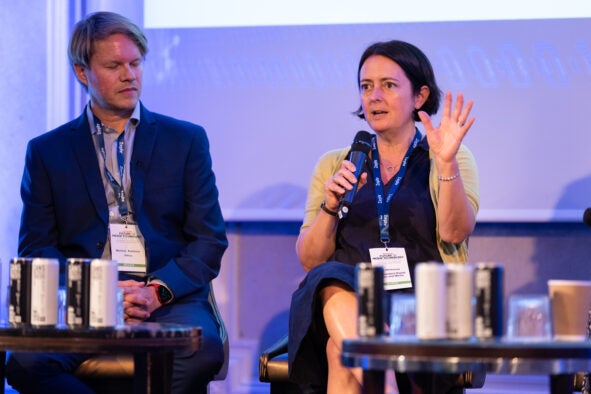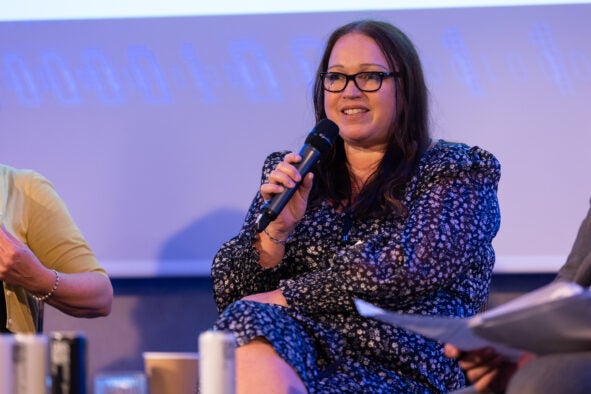
Digital chiefs at the Independent and Telegraph have been cutting the number of ads on web pages as the impending demise of third-party cookies forces publishers to rethink their approach to reader data and online advertising, Press Gazette’s Future of Media Technology conference was told.
It comes as Google has pushed back its phasing out of third-party cookies on Chrome – widely seen as the final nail in the cookie coffin – to the second half of 2024, and as the UK’s data watchdog begins to bare its teeth over data protection and privacy compliance for online advertising.
Publishers still relying on adtech vendors whose solutions are built on cookies are “gambling”, according to Markus Karlsson, chief executive at digital publishing platform Affino.
“You have no idea what that experience is going to be like or if you’re going to get the data if you rely on cookies in the way people do now,” he said, adding the publishing industry is “at a changing point”.
The UK Information Commissioner’s opinion report on data protection and privacy expectations for online advertising proposals, published in November, set out that “continued use of intrusive online tracking practices is not the right way to develop solutions” and said the commissioner “does not advocate for alternatives that use the same fundamentally flawed approaches”.
Cookies that identify users are considered personal data under the General Data Protection Regulation, which only allows companies to process users’ data with consent.
[Read more: How Google is building an internet without cookies – and why publishers are concerned]
Publishers need to be ‘more vigilant’
Jo Holdaway, chief data and marketing officer at Independent Digital News and Media, which publishes The Independent news website, warned that publishers must be careful not to fall foul of the UK data watchdog and should audit adtech partners for compliance – something IDNM is doing.
Holdaway (pictured, second right) said: “There are ID vendor companies or content verification companies that are collecting publisher data on the sly, building their own contextual segments and selling them on down the market. And publishers either don’t know about that or can’t do anything to change it.
“Well, we are changing that. It’s giving the adtech landscape a bad name and publishers need to be a little bit more vigilant, which is what we’re trying to do, but it’s very easy to say: ‘Be vigilant. Audit your partners, make sure that they’re compliant, make sure that they’re giving you a decent return in a responsible and accountable way,’ when you need to hit next month’s revenue budget.
“It does require transformation internally, from a cultural perspective, to try and educate your commercial team and say: ‘Look, we don’t want you to lose revenue, but we think if we have less weight on the page, and if we try and make our site performance much better and we sort our pricing strategy out, valuing our data as we should, we should be able to get away with fewer partners on the site.’
“That means better engagement figures, better [user experience], more engaged readers coming back to the site, and you could probably make more revenue that way.”
She said publishers need to have a “mid- to long-term view on this because the regulators have got teeth and they are getting more vigilant. If you’re a publisher that signs a contract with an adtech vendor that gets stung, you’ll also get stung.”

Markus Karlsson of Affino and Jo Holdaway of The Independent at the Future of Media Technology conference. Picture: ASV Photography Ltd
She added: “It’s all about trust. [Readers] trust you with their data because you’re a brand they really love. So you have to do them that consideration by taking care of it on their behalf.”
The Independent, which runs an ads-first model complemented by subscriptions, went from collecting 20,000 registrations a month to 200,000, according to Holdaway, after putting a registration gate on all of its content, prompting readers to sign up for free to continue reading (although they can defer doing so).
Holdaway said the gating decision required board approval and was a “big hurdle to overcome”, but is now driving most of its first-party data acquisition together with lead generation from newsletters.
“There’s no point having, as we will by the end of the month, four million registered users if you can’t get them back on the site to learn about them or monetise them,” she said.
Bravery will pay off
Also speaking at the panel on the so-called “cookie apocalypse”, held at the Waldorf Hilton Hotel in London on 21 September, was Karen Eccles, managing director of digital, partnerships and innovation at Telegraph Media Group.
Eccles explained why the Telegraph had been reducing its ratio of digital ads on the page.
“Categorically one ad on the page that is well targeted using first-party data – preferably where you know the client so there’s a fit with the overall brand – if that is worth to an advertiser five times more than being one of five ads that are competing with each other on the page and creating a bad user experience, you might as well go with the one because you will be having that direct relationship with an advertiser,” she said.
“We look now sometimes at are we going too light [on ads]? Should we be reintroducing some advertising and increasing our ad ratio? And all the maths we do says it’s just diminishing returns. As soon as we put additional ads on the page our overall yield decreases.
“So I say if publishers can be quite brave… and if we understand the value of what that quality ad experience means to the reader and to the advertiser and that that is then going to be paid back to the publisher, it’s really well worth it. I think letting the controls for monetisation sit with the open marketplace, we’re just not going to see the returns as publishers from that.”

Karen Eccles of The Telegraph at the Future of Media Technology conference. Picture: ASV Photography Ltd
The Telegraph has a subscriptions-first model complemented by advertising revenue. It launched its subs-first strategy in 2018, putting content behind a strict paywall, and now has several million registered users and almost 740,000 paying subscribers in print and digital.
“All of that growth has come pretty much from digital subscriptions, which we didn’t have three or four years ago,” said Eccles. “And what that means is we had to commit absolutely, ruthlessly to a subs strategy.”
‘Data isn’t just for the big guys’
At The Spectator, chief technical officer and director of digital Peter Barr-Watson said the title is in the process of “re-platforming everything digital”, driven by the installation of its own data management platform.
“Data has to drive us,” Barr-Watson told the conference.
“We’re going through that process now where we’re making everything about the data, that’s forming the basis, and then we can make decisions off the back of that when it comes to segmentation and activating that data.”
He said there was a misconception in the industry that data is something only large-scale publishers should be taking seriously. “The smaller companies out there – the SMEs if you like – perhaps don’t take data as seriously, from what I’ve seen. And they need to.
“You need to be coming up with this data strategy for your own business moving forward, and acting on it sooner rather than later is definitely the key. Data isn’t just for the big guys.”
Picture: ASV Photography Ltd
Email pged@pressgazette.co.uk to point out mistakes, provide story tips or send in a letter for publication on our "Letters Page" blog
